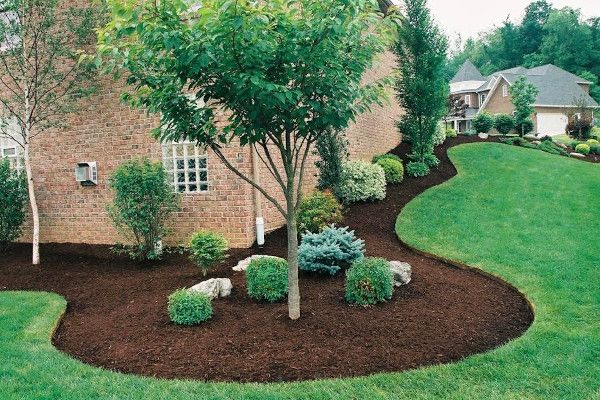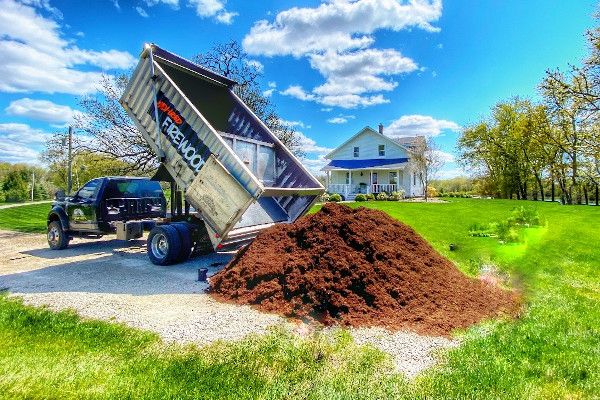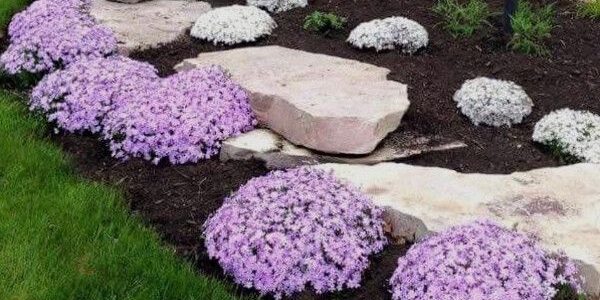Got Mulch? Check Out These Amazing Benefits of Mulching Flower Beds!
We serve some terrific gardeners here at Lumberjacks! What makes them great is that they don’t settle for mediocrity regarding their flower beds. Instead, they set their garden plots up to dominate the growing season! What’s their secret to a beautiful, thriving outdoor space? Mulching flower beds with a premium, organic product!
Is it really that easy to take your garden from good to great? Yes! If you’re already following a few basic guidelines (i.e., keeping up on weeds and trimming), premium mulch can push you the extra mile.
This blog will reveal the seven essential benefits of mulching flower beds. Once you read about these perks, you’ll never want to be without garden mulch again. Trust us!
Ready to discover the premium mulch difference? Let’s go!
1. Mulch Destroys Weeds
Every gardener knows that public enemy number one is weeds. Those hideous green monsters have terrorized many an innocent garden. Thankfully, mulch is here to bust those terrorists!
When you lay 2-4 inches of mulch over your soil, it will go straight to work choking out unwanted greenery. That means more nutrients for the plants you actually want in your garden beds and no freeloaders trying to stage a hostile takeover!
Mulch accomplishes this by acting as a barrier between the soil and unwanted seeds and sunlight. The seeds that lead to weed germination have difficulty penetrating the hardwood ground covering. Plus, with limited sunlight, weeds have a difficult time growing.
Even when weeds sprout from beneath the mulch, they’re much easier to uproot. This is because their roots aren’t nearly as long and robust as they would be without the mulch stunting their growth.
And since far fewer weeds spring up in a mulch-covered flower bed than in uncovered soil, the garden is much easier to manage. Less work for the gardener for a weed-free plot—sounds like a pretty sweet deal to us!
2. Plants Stay Hydrated
Our good friend, the sun, isn’t such a good friend to the soil. If the dirt in a flower garden is exposed to its rays for too long, things can get pretty dry pretty quickly!
Mulch refuses to let dry soil kill beautiful flowers. Instead, it shades the soil from the sun’s harsh rays, locking in the precious moisture needed to fuel a beautiful garden.
Mulch also keeps the top of the soil soft and ready to receive the water it needs. Without this protection, the crust hardens into a moisture-resistant layer. Good luck trying to grow anything in that soil!
Another great thing about this benefit is it saves you work! Since mulch-covered soil can lock in moisture for long periods, it requires less watering. So, instead of having to water your flower bed every day, you can get away with doing it two or three times a week!
Work smarter, not harder, is what we always say. Mulching flower beds allows you to do just that!

3. Soil Remains Temperate
If it’s too hot or cold in your house, you have difficulty functioning, right? The same goes for the flowers in your garden! When the soil is too hot or cold, your flowers will suffer the consequences.
Fortunately, mulch functions the same way that insulation functions in your home. It can keep the soil cool in the warm months and warm when it’s cold out. The key is to apply it strategically.
If you have flowers that thrive in cool soil, we’d recommend putting down mulch in the spring. That way, it can keep the soil cool as the hot summer months arrive.
The same goes for plants that love warmer soil. Put the mulch down during the summer to help your plants thrive well into autumn and winter.
Because mulching flower beds maintains soil temperature, it also allows for planting earlier in a season than would be possible with bare soil. This head start will give you the leg-up you need to have an impressive garden well before any of your neighbors!
4. Gardens Bulk Up
Superstar athletes need to eat their Wheaties to perform well. Likewise, superstar flower beds feast on mulch to strut their stuff.
Organic mulch, like the wood chips or bark mulch we provide here at Lumberjacks, provides nutrients gardens need to thrive. The mulch deteriorates over time, adding to the health and fertility of the soil. Earthworms and plants love to feed on the nutrients the mulch leaves behind, bolsters the garden’s overall liveliness and beauty.
Hardwood mulch also improves the ability of sandy soils to hold and drain moisture. Likewise, clay soils have an easier time aerating and are much sturdier when mulch is present.
Overall, a flower bed with a thick layer of mulch is much less likely to erode over time. It’s certainly a strong and impressive specimen to behold!

5. Health Hazards Take a Hike
When your garden runs like a well-oiled machine, the last thing you want is an unforeseen illness to strike your plants. Fortunately, mulch’s protection extends to keeping pests and diseases away as well.
Certain types of mulch, including cedar, pinewood, and cypress wood chips, have been known to ward off harmful fleas and ticks. Any experienced gardener will understand the havoc these pests can wreak!
Premium mulch also plays an essential role in averting soil-borne illnesses. It does this by preventing soil from splashing up onto plants during watering. These soil stains can carry diseases that are harmful to the plants. And without mulch there to protect them, your flowers will be sitting ducks.
As you can see, mulching flower beds is like vaccinating them. It can keep your beautiful roses, daisies, and daffodils sturdy and lovely.
6. Winter Threats are Neutralized
But what about the winter? Sure, it’s great to have the benefits of mulch during the growing season, but what’s the point if winter can still damage your flower beds?
Good news! Mulch has that taken care of, too!
The hardwood ground covering is perfect for protecting your plants’ roots during the harsh winter months. It will shield the hard work you put in so that you can enjoy it again next spring.
One of the harshest wintertime foes for your plants is frost heaving. Frost heaving occurs when the temperature fluctuations that occur during winter cause the soil to expand and contract. This movement can push plants and their roots to the ground’s surface, exposing them to the winter cold. Plants can be seriously harmed or even die as a result.
The good news is mulching flower beds protects against frost heaving by regulating soil temperature. Because the soil temperature remains constant, it doesn’t expand or contract, and frost heaving cannot occur.
It’s certainly nice to know mulch is still at work protecting our plants even as we hibernate in our homes! So you can enjoy your favorite warm beverage and kick up your feet with absolute peace of mind, knowing your garden beds will still be magnificent come spring.

7. Mulch Looks Amazing
As you can see, premium mulch does plenty to look after a garden’s physical needs. That’s great and all. But our favorite benefit by far is how it makes a garden look.
The fact is premium mulch takes an attractive garden and makes it drop-dead gorgeous! The ground cover fills in flower beds for a clean look distinguished from the rest of the yard.
Since mulch comes in beautiful colors like red and brown, it can add some extra zest to an already colorful plot. There’s a mulch type and color for every landscape aesthetic!
Going for a relaxing rustic theme? Red mulch is an excellent choice. Want something more modern and elegant? Try black mulch. Want a no-fuss look that allows your plants to take center stage? Brown or undyed mulch is perfect!
Mulch is also essential if your yard has multiple separate landscape beds. Filling each of those beds with the same mulch gives your yard a very unifying look.
Don’t deny it. Mulch is beautiful. It’s the icing on top of the delicious cake that is a well-tended garden!
Want these Benefits Mulching Flower Beds?
So, what do you think? These benefits sound pretty good, don’t they?
If you’re chomping at the bit to get your mulch on, then we’d love to help! Lumberjacks has a wide selection of premium groundcovers to choose from. Feel free to give us a call or stop at one of our locations to sample our products.
Happy mulching!
Editor’s Note: This blog was originally published in September of 2020 and was updated in January of 2024.








